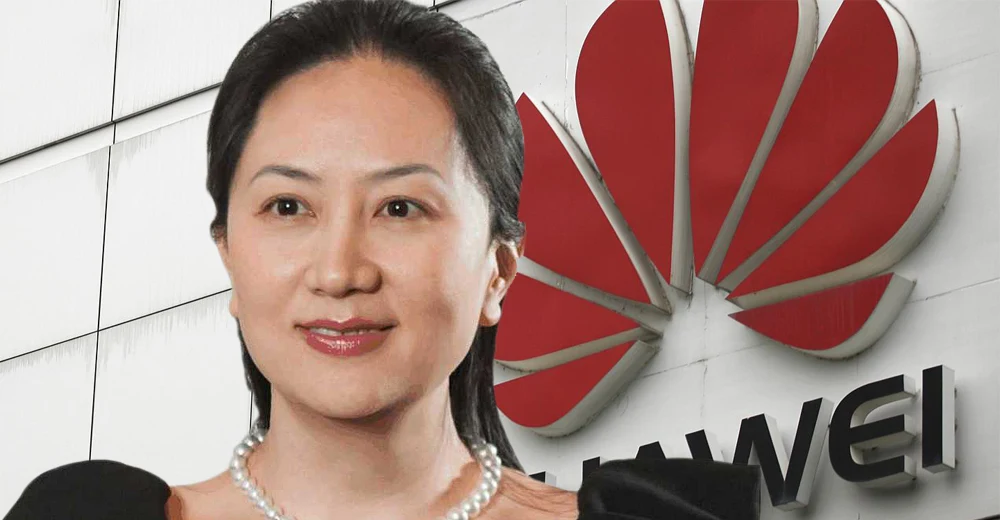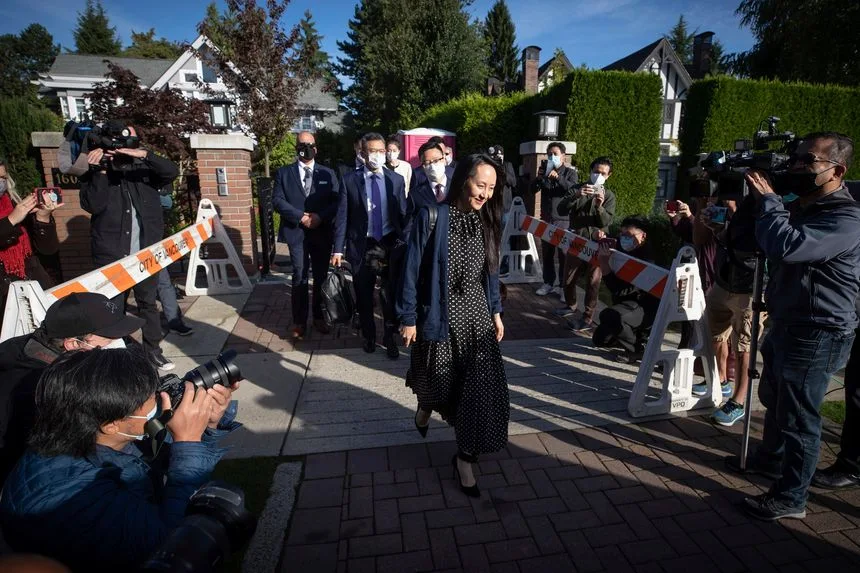Huawei CFO Meng Wanzhou / SCP. The U.S. Justice Department has reached a deal that will allow Huawei Technologies Co. finance chief Meng Wan...
 |
| Huawei CFO Meng Wanzhou / SCP. |
 |
| Meng Wanzhou, the chief financial officer of Huawei, leaving her home in Vancouver Friday / AP. |
In statements last month marking 1,000 days since Ms. Meng’s arrest, Chinese officials in Beijing and Canada said she had been arbitrarily detained and called her case “purely a political incident” aimed at obstructing China’s high-technology and scientific development.
Caught in the middle of the two superpowers is Canada, which has seen its trade with China plunge and two of its citizens detained in China within days of Ms. Meng’s 2018 arrest. According to people familiar with the matter, a deal with Ms. Meng could lead to the release of businessman Michael Spavor and Michael Kovrig, a Canadian diplomat on leave, who have been confined to separate Chinese facilities and prisons since December 2018.
 |
| Huawei CFO Meng Wanzhou / AP. |
Arrested nearly three years ago while transferring planes in Vancouver, Ms. Meng was indicted in 2018, alongside her employer, on charges of violating U.S. sanctions on Iran, by misleading banks in 2013 about the Chinese company’s ties to Iran. Ms. Meng, who has denied the charges, has since been confined to Vancouver, where she owns a home.
Last year, prosecutors obtained additional charges against Huawei and two of its U.S. subsidiaries, including racketeering conspiracy and conspiracy to steal trade secrets, adding pressure on the company as U.S. officials worked to persuade allies around the world to lock the telecommunications giant out of their next-generation mobile networks because of national-security concerns.
Huawei isn’t expected to be a part of the deal regarding Ms. Meng, and will continue to fight the charges it faces, the people said. Since she was arrested at Vancouver’s airport in December 2018, Ms. Meng has become the global face of trade and technology tensions between the U.S. and China. The Trump administration viewed Huawei as a national security threat and portrayed Ms. Meng’s alleged coverup of ties in Iran as part of a pattern of corporate wrongdoing.
Within Huawei, Ms. Meng has become a celebrated figure, and securing her release has long been a priority for company leadership. Letters from Ms. Meng from Vancouver have been widely circulated to Huawei staff back in China, and slogans calling for her return have been emblazoned on coffee cups and other items at Huawei headquarters in Shenzhen.
The company has faced several rounds of sanctions as U.S. officials have long alleged Huawei gear could enable Chinese espionage in the countries that install it. The company has repeatedly said its gear is safe and that it would never spy on behalf of any government. A year ago, Huawei was the world’s largest maker of smartphones after cornering about one-fifth of the global handset market.
The U.S. sanctions have cut the company off from crucial computing chips and software, and its second-quarter phone shipments plunged by more than 80% from a year earlier. On Friday, a senior company executive said U.S. sanctions would cost Huawei up to $40 billion in lost smartphone revenue this year. The renewed talks to resolve Ms. Meng’s case picked up one month after a Vancouver judge wrapped up nearly two years of court hearings tied to a Justice Department request to have Ms. Meng extradited to the U.S. The judge had been expected to issue her decision later this year. Extraditions to the U.S. are rarely barred in Canada and the judge had ruled against Ms. Meng on a handful of key legal arguments.
The court reversals have discouraged Ms. Meng, particularly during the past year, people familiar with the matter said. She spends most of her time in her large Vancouver home where she is supervised by court-appointed security guards, the people said. Most days she consults with her legal team about her case, practices English with an online tutor, paints and exercises, they said. Ms. Meng hasn’t seen her husband and children since they visited her in Vancouver in the spring.
Any deal to free Ms. Meng risks a backlash in Congress, where some Republicans have accused the Biden administration of being too lenient against Huawei compared with former President Donald Trump. On Thursday, Commerce Secretary Gina Raimondo told the Journal that her department would continue efforts to block Huawei from getting advanced chips.
In recent weeks, developments in China related to the cases against the two Canadian men who have been detained there pointed to a possible resolution on the horizon. Last month, Mr. Spavor was sentenced by a Chinese court to 11 years on espionage charges, with the court saying he would be expelled, without specifying when. Mr. Kovrig was tried this year on similar charges but the court hasn’t announced a verdict.
Family members of Mr. Spavor have said they disagreed with the charges and Mr. Kovrig’s wife has said he was innocent. Representatives of the families couldn’t immediately be reached on Friday.

.jpg)





